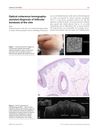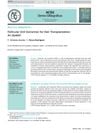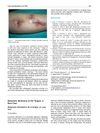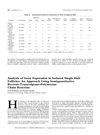 6 citations,
June 2011 in “Pharmacognosy Journal”
6 citations,
June 2011 in “Pharmacognosy Journal” Many products for hair re-growth exist, but a perfect treatment without side effects has not yet been found.
 6 citations,
November 2007 in “Archives of Disease in Childhood: Education & Practice”
6 citations,
November 2007 in “Archives of Disease in Childhood: Education & Practice” The document concludes that accurate diagnosis of alopecia in children relies on thorough examination and history, and while treatments exist, none can alter the course of alopecia areata, which can significantly affect a child's psychological well-being.
 5 citations,
February 2015 in “JEADV. Journal of the European Academy of Dermatology and Venereology/Journal of the European Academy of Dermatology and Venereology”
5 citations,
February 2015 in “JEADV. Journal of the European Academy of Dermatology and Venereology/Journal of the European Academy of Dermatology and Venereology” OCT can non-invasively diagnose follicular keratosis and other hair follicle disorders.
 5 citations,
June 2012 in “Journal of Liquid Chromatography & Related Technologies”
5 citations,
June 2012 in “Journal of Liquid Chromatography & Related Technologies” Method accurately measures finasteride concentration in medicine.
 4 citations,
August 2005 in “Archives of Dermatological Research”
4 citations,
August 2005 in “Archives of Dermatological Research” Higher p63 and CD34 levels found in specific scalp areas may affect hair loss progression.
 1 citations,
June 2017 in “Actas Dermo-Sifiliográficas”
1 citations,
June 2017 in “Actas Dermo-Sifiliográficas” Follicular Unit Extraction (FUE) is a hair transplant method with less scarring and discomfort but requires skilled surgeons and has limitations on graft numbers per session.
 1 citations,
January 2017 in “Springer eBooks”
1 citations,
January 2017 in “Springer eBooks” Hair follicles are important for drug delivery through the skin, but better methods are needed to understand and improve this process.

Stem cell therapy shows promise for treating hair loss in androgenetic alopecia.
 January 2024 in “Brazilian Journal of Hair Health”
January 2024 in “Brazilian Journal of Hair Health” Modern hair care trends often reinvent old practices to create new trends or reinforce existing ones.
 January 2024 in “Deleted Journal”
January 2024 in “Deleted Journal” Essential oils may help hair health but lack strong scientific proof and can cause allergic reactions.
 September 2023 in “Nature communications”
September 2023 in “Nature communications” Alk1 in specific cells is crucial for proper nerve branching and hair function.
 December 2021 in “Biomedical journal of scientific & technical research”
December 2021 in “Biomedical journal of scientific & technical research” Oral processed egg yolk improves hair regrowth and quality in alopecia patients.

The review found that PRP is the most effective treatment for hair loss with few side effects.
 July 2018 in “Elsevier eBooks”
July 2018 in “Elsevier eBooks” Acne keloidalis nuchae is a chronic skin condition more common in African men, causing itchy or painful bumps and can lead to permanent hair loss if not treated early.
 January 2016 in “Springer eBooks”
January 2016 in “Springer eBooks” New materials and methods could improve skin healing and reduce scarring.
 November 2012 in “Actas Dermo-Sifiliográficas”
November 2012 in “Actas Dermo-Sifiliográficas” An 86-year-old man had a rare tongue melanoma but refused treatment, showing the need for early cancer detection and treatment.
 May 2011 in “Journal of The American Academy of Dermatology”
May 2011 in “Journal of The American Academy of Dermatology” Objective assessment is needed to accurately determine medication use and adherence.
 July 1998 in “Chromatographia”
July 1998 in “Chromatographia” Women with effluvium have higher levels of certain urinary steroids, possibly due to stress and increased adrenal activity.
 May 1995 in “Journal of Investigative Dermatology”
May 1995 in “Journal of Investigative Dermatology” Researchers developed a new way to measure gene activity in single hair follicles and found that a specific gene's activity changes with different amounts and times of treatment.
 August 2020 in “Actas Dermo-Sifiliográficas”
August 2020 in “Actas Dermo-Sifiliográficas” PRP injections improve hair density in men with hair loss, with few short-term side effects.
 306 citations,
April 2019 in “International Journal of Molecular Sciences”
306 citations,
April 2019 in “International Journal of Molecular Sciences” The skin has a complex immune system that is essential for protection and healing, requiring more research for better wound treatment.
 255 citations,
October 1985 in “The Journal of Clinical Endocrinology & Metabolism”
255 citations,
October 1985 in “The Journal of Clinical Endocrinology & Metabolism” Spironolactone treatment increases the amount of testosterone available in the body.
 208 citations,
January 2013 in “Lab on a Chip”
208 citations,
January 2013 in “Lab on a Chip” The Multi-Organ-Chip improves the growth and quality of skin and hair in the lab, potentially replacing animal testing.
 192 citations,
March 1998 in “British Journal of Dermatology”
192 citations,
March 1998 in “British Journal of Dermatology” Minoxidil boosts growth factor in hair cells, potentially promoting hair growth.
 180 citations,
January 2003 in “American Journal of Clinical Dermatology”
180 citations,
January 2003 in “American Journal of Clinical Dermatology” Menopause can lead to skin and hair problems due to hormonal changes, but hormone replacement therapy might help slow these effects.
 165 citations,
January 2008 in “Journal of biomaterials science. Polymer ed.”
165 citations,
January 2008 in “Journal of biomaterials science. Polymer ed.” The peptide GHK-Cu helps heal and remodel tissue, improves skin and hair health, and has potential for treating age-related inflammatory diseases.
 160 citations,
March 2009 in “Seminars in Cutaneous Medicine and Surgery”
160 citations,
March 2009 in “Seminars in Cutaneous Medicine and Surgery” New insights show Lichen Planopilaris is a rare, scarring hair loss condition, hard to treat, mainly affecting middle-aged women, and significantly impacts mental health.
 138 citations,
May 2000 in “Maturitas”
138 citations,
May 2000 in “Maturitas” Estrogen replacement can improve skin health in menopausal women but doesn't reverse sun damage or prevent hair loss.
 122 citations,
April 2011 in “European Journal of Pharmaceutics and Biopharmaceutics”
122 citations,
April 2011 in “European Journal of Pharmaceutics and Biopharmaceutics” Particles around 100 nm can penetrate and stay in hair follicles without passing through healthy skin, making them safe for use in topical products and useful for targeted drug delivery.
 102 citations,
July 2007 in “Genes & Development”
102 citations,
July 2007 in “Genes & Development” A mother's PPARγ is crucial for preventing harmful milk that can cause inflammation and growth problems in babies.






























